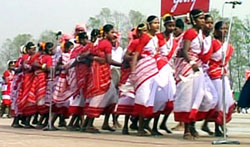 |
|
|
Feb 2005
Kaziranga (Assam): Fifty elephants attired in colourful velvet robes and tinkle anklets marched into the Kaziranga forest reserve in Assam as part of a week-long festival aimed at ending the conflict between animals and the human race. Lumbering their way into an open field, the elephants raised their trunks and their khaki-clad mahouts waved silk flags to salute hundreds of visitors at theKaziranga National Park over the weekend, as part of the park's centenary celebrations. Some elephants, along with the mahouts, walked more than 200 km (125 miles) to participate in the procession, but the star of the show was 11-month-old Rinki who waddled along with her mother through a two-km stretch in Kaziranga. Yusuf, a mahout, said this festival is organized to create awareness among the people about the habits of the animal so that they can live together in peace. "Elephant doesn't harm us, they love us. This festival draws the attention of the people that elephant is a good animal and encourages devotion for them. All these elephant come together, but they do not harm us," said Yusuf. The jungles of northeast India are home to about 7,500 elephants, half the country's total elephant population, but in recent years the normally gentle animals have been coming into conflict with man more frequently and more dangerously. As their traditional habitats are taken over by man, elephants have been raiding military depots, drinking liquor, terrorizing and killing villagers, destroying their farm houses and leaving a trail of destruction in large parts of Assam. A group of veterinary doctors accompanied by forest guards carried tranquilizers to sedate the animals in case they went on a rampage in the park on the banks of the river Brahmaputra. Kaziranga, with its tall thickets of grass, is ideal habitat for elephants, and the one-horn rhino, tigers, wild buffaloes, sloth bears, tigers and deer. Maharani Gayatri Devi, a royal patron, said the festival was a novel idea to protect and promote wildlife. "I have been here before and I love elephants. I come from Cooch Behar, where there are many elephants. That is why I am here," said Devi. "It is the people who have worked for 100 years, people who lost their lives. It is an amazing success considering what tigers going down, elephants going down. There were 18 or 12 left in 1980s and now there are over 1,200 of them. I think it is a remarkable success and people of Assam should be very proud of this," said Mark Shand,
brand ambassador of Kaziranga park. Elephants are revered in India,
and the half-man half-elephant god Ganesh is an important figure in
the Hindu pantheon. But gradually the respect for the animals and the
taboo against killing them is being worn down by conflict. As they fall
victim to increased poaching for ivory and their habitats disappear,
many stray out of the forest to block roads and rail tracks or look
for food in built-up areas. Some emerge from the jungle every year to
take advantage of the paddy harvest while others have discovered a taste
for local liquor, and drink everything they can lay their trunks on.
References: Kashmir avalanche,
Vaishno Devi yatra, Dharamsala heavy snowfall, hotels in-room fitness,
Kaziranga celebrates centenary, bridge to Rameswaram, Hotels, Airlines,
Ayurveda, Yoga, Hindu, Taj Mahal, Cuisine, Festival, Temple, Trekking,
Hindu, Bharatanatyam, Kathakali, Odissi, Shimla, Varanasi, Kullu, Manali,
Goa, Kovalam, Darjeeling, Bodh Gaya, Kancheepuram, Thekkady, Mussoorie,
Badrinath, Amar Nath, Vaishno Devi, Tirupathi, Sabarimala, Guruvayoor,
Kanyakumari, Kodaikanal, Ooty, Chennai, Travel News, India Travel Times,
Travel, Tourism, Tour, Tourist, India, Times, Indian, Tourist, Indian
Cuisines,
|
NOTE: Free contributions of articles and reports may be sent to editor@indiatraveltimes.com
DISCLAIMER
All Rights Reserved ©indiatraveltimes.com
